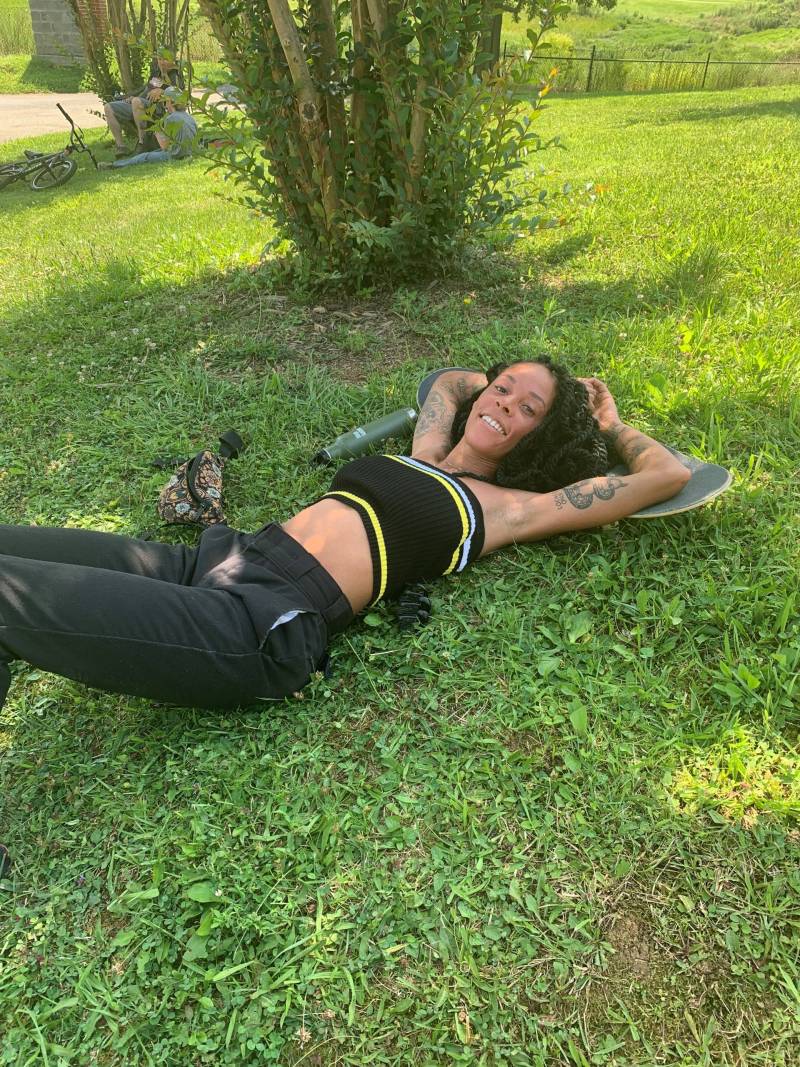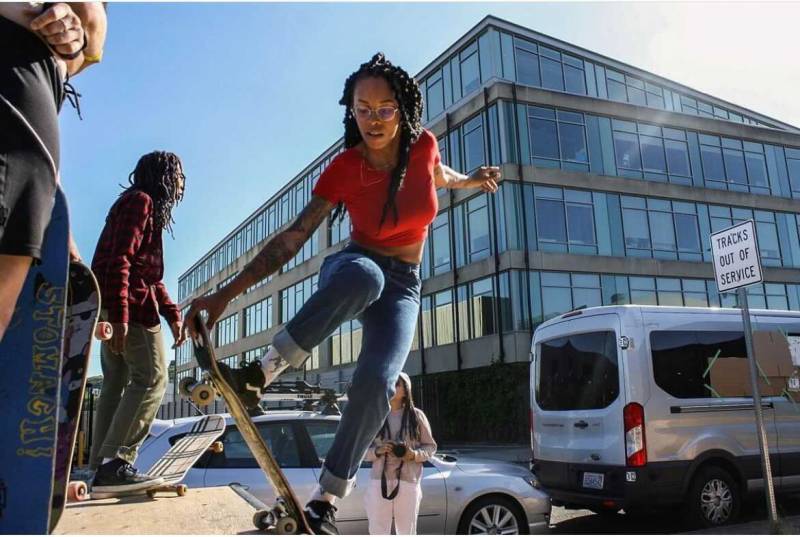Marsha Howard grew up in the skateboarding mecca of San Francisco.
After getting her first board as a gift from St. Anthony’s Christmas donation program, she’s since skated with friends in front of the Ferry Building and bombed down the windy roads of Twin Peaks.
She’s also worked at Thrasher Magazine and been a skateboarding fashion model.

Nowadays, she’s an educator who skates for exercise and mental health, while also using videos of her falling and getting back on her board to teach her elementary school students about perseverance.
This week, we talk to Marsha Howard about growing up skateboarding in this mecca, and how she navigated the ‘boys club’ by assembling a circle of non-male skaters around herself.
Below are lightly edited excerpts of my conversation with Omar Jones
Pen: So how did you get started? What was your first skateboarding experience like?
Marsha: I wanted a bike really bad, I was like 13 or 14. I grew up in the city. My mom was a single mother. So we really didn’t have, like, money at all. We lived in shelters sometimes, we were very, very low on the socioeconomic scale.
Marsha: There used to be this thing where St. Anthony’s in San Francisco would have a bunch of toys that they would give to the kids at Christmas time and families could come wait in this super long line and get toys to re-gift to their kids.
Marsha: One of the things my mom got was a skateboard from that line. And I was like, I didn’t want a skateboard, I wanted a bike. But it was free. And my mom was like, ‘you gonna get what I give you.’
Marsha: I just started riding the skateboard around. At first I was just knee boarding it, on my knees, just pushing around, not looking cool at all. And then I made some friends at school. I was already into punk music, so I was already kind of associated with a lot of the white kids in my middle school.
Marsha: So when they saw I had a skateboard they’re like, ‘oh, you skateboard, cool, let’s do it, like you’re part of the crew.’ So I just started hanging out with a bunch of little white dudes at school. They were super nice. They would take me to the skate park.
Pen: So tell me, what was it like being one of the only girls around on a skateboard?
Marsha: The only space for a woman in skateboarding back in my day was modeling.
Marsha: These were different times… exploiting women was, like, OK or acceptable back then. And I didn’t even realize I was being exploited because I was loving it. So it was fun for me, but I was the sexy model girl who would be at skate contests passing out stickers and swag.
Marsha: So I had a very small fan base within skateboarding, but it was mostly just horny boys that thought I was hot, it wasn’t anything like, “this girl rips!”
Pen: When you found other women to skate with… How did that experience differ from skating with boys?
Marsha: I think the biggest difference was just like the vibe.
Marsha: When I started getting better around the boys, it was a little bit more competitive. And I could feel that vibe of, ‘OK, you’re, you’re mad that I’m getting this trick, so let me stop.’
Marsha: I felt like if I’m ripping too hard, they’re not going to want to hit me up to skate anymore, because it was like, ‘no, she’s showing me up and she’s a girl. Let’s not even hit her up.’ So sometimes I did feel like I should just chill and I would hang out and smoke weed or whatever because I didn’t want to make it weird or have anybody questioning their manhood. But ugh [laughs] with the girls, it’s like a whole different vibe. Nobody gives a shit if you’re skating good, if you’re skating bad… There is no skating good, skating bad.
Marsha: There’s a lot of collaboration. Everybody’s teaching each other, there’s a lot of learning from each other.
Marsha: So ever since I made my little group of friends – which isn’t really that little – it’s like a big group of like 30 women. [laughs] I am very adamant about not skating with boys to the point where my friends are annoyed at me for it. Like, I’ll ask them, ‘is there going to be a dude there? Is it a girl sesh?’ And if it’s not, I’m just not interested. Just because I went so long without having any girls and having to skate with all these boys and having them come kill my vibe sometimes, I’m just like, I don’t have to do that. I have 30 other girls that I can hit up if you’re skating with dudes today. It’s cool.
Marsha: Ladies only! [laughs] because I’ve been deprived!
Pen: Given what you had to go through to get there it makes sense.
Marsha: I didn’t even mention all of the different ways that I’ve been like talked down to racially. There’s so many different things that have happened to me throughout my skateboarding career that just has caused me to move further and further away from the boys club and more towards ‘we need to empower more women to be excited about this sport,’ because there are a lot of girls that like it. They’re just scared because it’s not a very welcoming community in that sense when it comes to women.

Rightnowish is an arts and culture podcast produced at KQED. Listen to it wherever you get your podcasts or click the play button at the top of this page and subscribe to the show on NPR One, Spotify, Apple Podcasts, TuneIn, Stitcher or wherever you get your podcasts.


